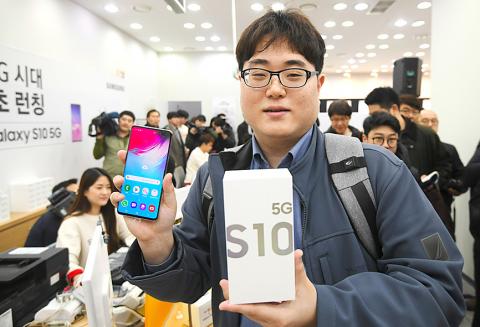The world’s biggest smartphone and memorychip maker Samsung Electronics Co yesterday warned of a more than 60 percent plunge in first-quarter operating profit in the face of weakening markets.
Operating profit for the first quarter would be “approximately 6.2 trillion won [US$5.45 billion],” the firm said in a statement, down 60.4 percent year-on-year.
Sales were about 52 trillion won, it said, marking a 14 percent drop.

Photo: AFP
The firm has enjoyed record profits in recent years, despite a series of setbacks, including a humiliating recall and the jailing of its de facto boss, but now the picture has changed, with chip prices falling as global supply increases and demand weakens.
The company’s earnings estimate was below analyst forecasts of 6.9 trillion won, according to Bloomberg News.
It would represent the firm’s lowest operating profit since the third quarter of 2016 and it comes after the firm reported its first fall in quarterly profit for two years in January.
Samsung shares yesterday closed down 0.2 percent in Seoul.
The company has to contend with increasingly tough competition in the smartphone market from Chinese rivals such as Huawei Technologies Co (華為) — which in 2017 surpassed Apple Inc to take second place — offering quality devices at lower prices.
Samsung supplies components to other manufacturers such as Apple as well as making its own devices, but market prices for LCDs have fallen 10 percent quarter-on-quarter, said Sanjeev Rana, an analyst at investment firm CLSA Ltd, while demand for smartphones in China — the world’s biggest market — has been weak.
Prices for NAND memory — used in smartphones and other devices — fell 20 percent in the first quarter, according to market tracker DRAMeXchange, which pointed the finger at consumers taking longer to replace their smartphones and lower-than-expected sales of Apple’s new devices.
DRAM chips, used in computer servers, fell by similar levels, it added.
Rana predicted a “slight” rebound in the second quarter.
“This quarter is the bottom in terms of earnings,” Rana said.
Samsung was yesterday launching the 5G version of its top-end Galaxy S10 smartphone — the first such device available anywhere — after South Korea this week won the global race to commercially launch the world’s first nationwide 5G networks.
South Korea’s three telecoms — SK Telecom, KT and LG Uplus — held launch events across Seoul for the Galaxy S10, whose base version costs 1.39 million won.
Before yesterday’s debut of the Samsung phone, 5G services had been restricted to a handful of specially selected users in South Korea.
Rival manufacturer LG Electronics Co is due to launch its V50 ThinQ, another 5G phone, later this month, while in the US, Verizon Communications Inc’s network works with Lenovo Group Ltd’s (聯想) Moto Z3 smartphone fitted with a special accessory.
Commercializing 5G gives South Korea the chance to build around the technology, which is crucial for the future development of devices such as autonomous vehicles and the Internet of Things.
It is expected to bring about US$565 billion in global economic benefits by 2034, according to the London-based Global System for Mobile Communications, an industry alliance.

Sweeping policy changes under US Secretary of Health and Human Services Robert F. Kennedy Jr are having a chilling effect on vaccine makers as anti-vaccine rhetoric has turned into concrete changes in inoculation schedules and recommendations, investors and executives said. The administration of US President Donald Trump has in the past year upended vaccine recommendations, with the country last month ending its longstanding guidance that all children receive inoculations against flu, hepatitis A and other diseases. The unprecedented changes have led to diminished vaccine usage, hurt the investment case for some biotechs, and created a drag that would likely dent revenues and

Global semiconductor stocks advanced yesterday, as comments by Nvidia Corp chief executive officer Jensen Huang (黃仁勳) at Davos, Switzerland, helped reinforce investor enthusiasm for artificial intelligence (AI). Samsung Electronics Co gained as much as 5 percent to an all-time high, helping drive South Korea’s benchmark KOSPI above 5,000 for the first time. That came after the Philadelphia Semiconductor Index rose more than 3 percent to a fresh record on Wednesday, with a boost from Nvidia. The gains came amid broad risk-on trade after US President Donald Trump withdrew his threat of tariffs on some European nations over backing for Greenland. Huang further

CULPRITS: Factors that affected the slip included falling global crude oil prices, wait-and-see consumer attitudes due to US tariffs and a different Lunar New Year holiday schedule Taiwan’s retail sales ended a nine-year growth streak last year, slipping 0.2 percent from a year earlier as uncertainty over US tariff policies affected demand for durable goods, data released on Friday by the Ministry of Economic Affairs showed. Last year’s retail sales totaled NT$4.84 trillion (US$153.27 billion), down about NT$9.5 billion, or 0.2 percent, from 2024. Despite the decline, the figure was still the second-highest annual sales total on record. Ministry statistics department deputy head Chen Yu-fang (陳玉芳) said sales of cars, motorcycles and related products, which accounted for 17.4 percent of total retail rales last year, fell NT$68.1 billion, or

MediaTek Inc (聯發科) shares yesterday notched their best two-day rally on record, as investors flock to the Taiwanese chip designer on excitement over its tie-up with Google. The Taipei-listed stock jumped 8.59 percent, capping a two-session surge of 19 percent and closing at a fresh all-time high of NT$1,770. That extended a two-month rally on growing awareness of MediaTek’s work on Google’s tensor processing units (TPUs), which are chips used in artificial intelligence (AI) applications. It also highlights how fund managers faced with single-stock limits on their holding of market titan Taiwan Semiconductor Manufacturing Co (TSMC, 台積電) are diversifying into other AI-related firms.